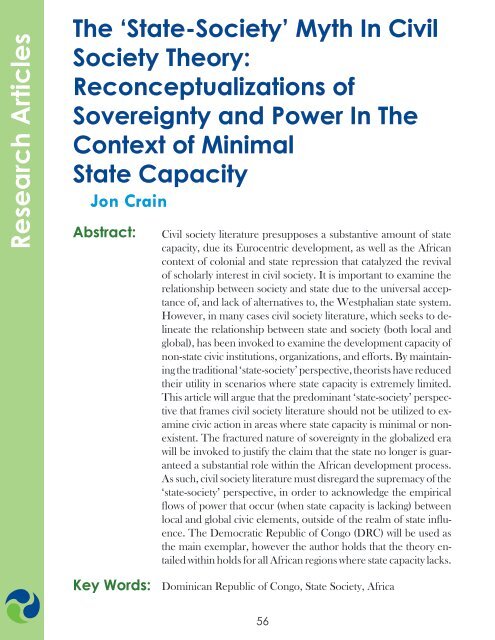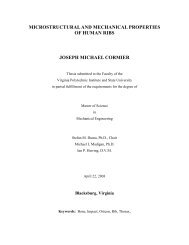Research Articles - VTechWorks - Virginia Tech
Research Articles - VTechWorks - Virginia Tech
Research Articles - VTechWorks - Virginia Tech
Create successful ePaper yourself
Turn your PDF publications into a flip-book with our unique Google optimized e-Paper software.
<strong>Research</strong> <strong>Articles</strong><br />
The ‘State-Society’ Myth In Civil<br />
Society Theory:<br />
Reconceptualizations of<br />
Sovereignty and Power In The<br />
Context of Minimal<br />
State Capacity<br />
Jon Crain<br />
Abstract: Civil society literature presupposes a substantive amount of state<br />
capacity, due its Eurocentric development, as well as the African<br />
context of colonial and state repression that catalyzed the revival<br />
of scholarly interest in civil society. It is important to examine the<br />
relationship between society and state due to the universal acceptance<br />
of, and lack of alternatives to, the Westphalian state system.<br />
However, in many cases civil society literature, which seeks to delineate<br />
the relationship between state and society (both local and<br />
global), has been invoked to examine the development capacity of<br />
non-state civic institutions, organizations, and efforts. By maintaining<br />
the traditional ‘state-society’ perspective, theorists have reduced<br />
their utility in scenarios where state capacity is extremely limited.<br />
This article will argue that the predominant ‘state-society’ perspective<br />
that frames civil society literature should not be utilized to examine<br />
civic action in areas where state capacity is minimal or nonexistent.<br />
The fractured nature of sovereignty in the globalized era<br />
will be invoked to justify the claim that the state no longer is guaranteed<br />
a substantial role within the African development process.<br />
As such, civil society literature must disregard the supremacy of the<br />
‘state-society’ perspective, in order to acknowledge the empirical<br />
flows of power that occur (when state capacity is lacking) between<br />
local and global civic elements, outside of the realm of state influence.<br />
The Democratic Republic of Congo (DRC) will be used as<br />
the main exemplar, however the author holds that the theory entailed<br />
within holds for all African regions where state capacity lacks.<br />
Key Words: Dominican Republic of Congo, State Society, Africa<br />
56



